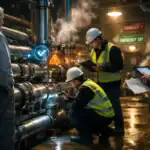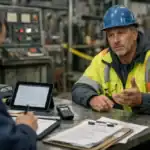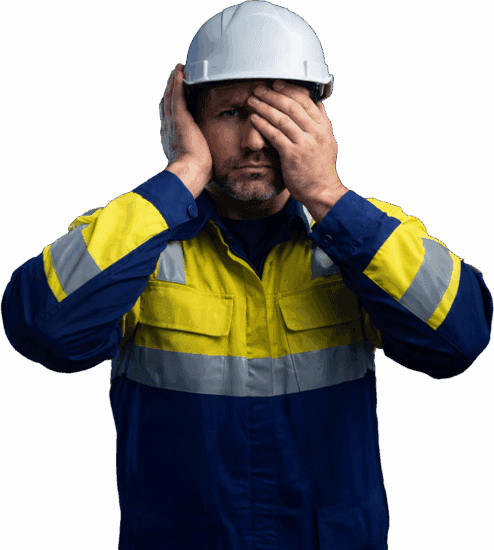Being a construction worker is also one of the most hazardous occupations in the UK today. A staggering 39% of all fatal workplace injuries in the 2020/21 period were related to the construction industry, as the latest reports from the Health and Safety Executive (HSE) show.
This is why ensuring health and safety management systems are in place and functioning is paramount in the sector. An overarching element to this system is competence. Every person working on a site must be sufficiently competent to do their job. They have both a moral and legal duty to do so.
Competency is ‘the combination of training, skills, experience and knowledge that a person has and their ability to apply them to perform a task safely’, as defined by the HSE. To be competent at one’s job, a person must be able to consistently assume responsibilities and carry out tasks to a recognised standard.
However, competencies are not simply skills. Competence also encompasses a person’s knowledge, experience, attitude, personality and physical abilities. While a skill is a specific ability to perform a task, competency means that a person also knows the correct manner in which to carry out the task.
In other words, skills are specific to certain tasks, while competencies can often be broadly applied. For example, a worker that knows how to operate a piece of heavy machinery has a skill, but a worker who can operate the machinery and also knows how to do so in accordance with best health and safety practices is competent.
The most important legislation impacting the construction industry is the Construction (Design and Management) (CDM) Regulations 2015. And a key risk control strategy for any CDM project are safe systems of work. However, systems alone do not achieve safety. Competent people are also required.
You can have; for example, the best risk-assessment process going, but unless those using it; know how it works, it quickly becomes a meaningless paper exercise.
A common root cause of construction accidents; is a lack of worker competency. That is, people failing to work safely due to a lack of training and experience.
Common examples include:
- Designers who produce plans; that put construction phase workers at unnecessary risk due to a lack of understanding about design safety risk assessment
- Construction phase workers; who did not have basic training in how to implement the required safety controls, then fail to follow necessary; safe systems of work
- A Principal contractor; or contractors; who did not have adequate training in managing onsite work, then failed to check workers were following safe systems of work, and allowed work on tasks for which the worker was not adequately trained
And so, this is why the competency of every individual involved in a CDM project, from designers and planners, through to site workers, competency is fundamental to completing a safe project.
There is no simple definition of what it means to be competent. As mentioned, it is a combination of skills, knowledge and experience. And the skills knowledge and experience that are required depends on the job.
But as a starting point you’ve got to analyse the training someone has received against the tasks they will be performing – or their knowledge and skills.
A key legal duty is that clients, and their principals, are responsible for ensuring that they appoint people who are competent to carry out their duties. To fulfil this duty, there must therefore be a system for checking the competency of every employee. This may sound obvious, but it does not always happen.
Competency checks occur at different times and in many different ways during a project. This includes when contractors submit bid for work – they submit the training records for all the employees who will work on the job as part of a pre-qualification questionnaire, or PQQ .
Checks should also be carried out, when workers arrive on a construction site to start work. Duty holders must ask to see electronic training cards at this stage.
These site arrival checks are particularly important because those who actually turn up to do the work may not have been vetted during the PQQ. For example, a job may have been subcontracted to another company at the last minute, or the wrong worker has turned up to do the job.
To assist with the process of assessing individual work competency within the construction sector, there is a recognised training framework which can assist with competency assessment. It is called the Construction Skills Card Scheme, or CSCS card scheme.
CSCS is a scheme which is governed by Build UK. It’s an open source scheme that allows different affiliated providers to operate their own card scheme. So, you may see a variety of different cards carrying this logo.
All CSCS affiliated card schemes carry the logo and operate to the same standards and framework. There are a number of levels to CSCS cards, which are denoted by colours, each requiring different levels of training based on the role.
So, as an example, if a new contractor comes on site you would first need to ask what is the job? You would then swipe the card and check what level of training and qualification they have. Is it appropriate for what they are required to do?
Do they have sufficient training for each of the hazards they may face? For instance, if there is a chance that asbestos may be disturbed, have they completed Asbestos Awareness Training? If they are working at height on a mobile access tower, have they completed relevant training such as a PASMA qualification?
As a minimum, any manager or supervisor who puts people to work on a CDM site must check that they are the right person for the job in hand. If there is an accident one of the first questions that will be asked is, who checked their training records?
Near miss reporting doesn’t need to be arduous. An easy-to-follow process, which ultimately means an easy to report system, will not only encourage employees to complete reports but it may well increase the number of reports received. Increased reporting is an indication that there was a lack of reporting, something that is actually beneficial because it opens up the opportunity to put measures in place to prevent actual accidents from happening.
So, what this means is that the person who checks CSCS training cards is doing so to ensure workers are competent for the job at hand. They have a legal duty to do so.
Therefore, this is far more than a simple identity check. The person checking must be competent to check.
So, security guards on access gates should undertake identity checks only, unless of course they hold suitable construction management qualifications. This is a very important legal duty under the CDM regulations and fulfilling it goes a long way to preventing accidents and ill health.
The construction industry is one of the largest and most important industries in the UK, accounting for over 6% of general gross domestic product (GDP), according to recent figures. This massive industry employs over two million people throughout Britain.
At the same time, it is one of the most hazardous industries. As well as the highest rate of fatal injuries, it also reports some of the highest figures for work-related ill health (74,000) and non-fatal injuries (61,000) in the most recent year that data was available.
Anyone working in this industry has a duty to help bring these numbers down. Not just to protect the lives and costs of workers, but also to reduce the financial cost on the business and society.
The key to this is reducing the chance of human error. As such, we must ensure that no one comes on site unless they have the appropriate skills, training and knowledge to do their job properly and without risk to others.
The Human Focus Assessing & Managing Competencies in Construction course provides trainees with the skills to know what competency is, how it works and how to assess it. The course is designed to follow guidelines as laid out in the Construction Design and Management Regulations (CDM 2015) and is assured by the Royal Society for the Prevention of Accidents (RoSPA).






















